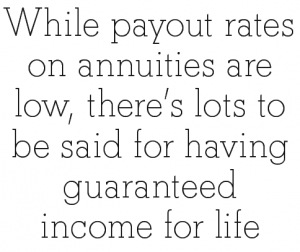Rich at any age: In your 70s
After these small financial tweaks, you're free to enjoy all life has to offer
Advertisement
After these small financial tweaks, you're free to enjoy all life has to offer
 One of the major things you’ll need to do is convert your RRSPs to RRIFs or annuities by the end of the year you turn 71 and then start making mandated withdrawals. If you’re concerned about outliving your nest egg, the early 70s might be an opportune time to put some money into annuities. While payout rates on annuities are very low due to low interest rates, there is still lots to be said for having guaranteed income for life. One good strategy is to buy enough annuities so that, in combination with government and employer pensions, you are assured of at least having your basic needs covered. But annuities aren’t for everyone, particularly those with poor health or reduced life expectancy.
One thing to look out for is the possibility of high care costs late in life. You might find you end up having to pay for expensive costs for in-home care or a retirement home, which in many cases are not covered by government these days. That’s why it’s a good idea to try to keep equity in your home as a reserve in case you encounter high costs while your financial savings might be running low. If it comes time to move into a retirement home, you can use the proceeds of selling your home to help cover those costs. If you stay in your home but need to pay for home-care assistance, you can potentially draw on the equity in your home through a reverse mortgage or equity line of credit.
Now is also a good time to plan your legacy, which can include giving money to charities or family members. If your finances are ample, consider giving away some money now if you see an immediate need, instead of leaving everything to your estate. For example, a contribution of even a few thousand dollars a year to a grandchild’s Registered Education Savings Plan (RESP) can make a huge difference to his or her future success and you’ll be remembered for it.
One of the major things you’ll need to do is convert your RRSPs to RRIFs or annuities by the end of the year you turn 71 and then start making mandated withdrawals. If you’re concerned about outliving your nest egg, the early 70s might be an opportune time to put some money into annuities. While payout rates on annuities are very low due to low interest rates, there is still lots to be said for having guaranteed income for life. One good strategy is to buy enough annuities so that, in combination with government and employer pensions, you are assured of at least having your basic needs covered. But annuities aren’t for everyone, particularly those with poor health or reduced life expectancy.
One thing to look out for is the possibility of high care costs late in life. You might find you end up having to pay for expensive costs for in-home care or a retirement home, which in many cases are not covered by government these days. That’s why it’s a good idea to try to keep equity in your home as a reserve in case you encounter high costs while your financial savings might be running low. If it comes time to move into a retirement home, you can use the proceeds of selling your home to help cover those costs. If you stay in your home but need to pay for home-care assistance, you can potentially draw on the equity in your home through a reverse mortgage or equity line of credit.
Now is also a good time to plan your legacy, which can include giving money to charities or family members. If your finances are ample, consider giving away some money now if you see an immediate need, instead of leaving everything to your estate. For example, a contribution of even a few thousand dollars a year to a grandchild’s Registered Education Savings Plan (RESP) can make a huge difference to his or her future success and you’ll be remembered for it.
 Rich at any age: In your teens »
Rich at any age: In your 20s »
Rich at any age: In your 30s »
Rich at any age: In your 40s »
Rich at any age: In your 50s »
Rich at any age: In your 60s »
Rich at any age: In your 70s »
Rich at any age: In your teens »
Rich at any age: In your 20s »
Rich at any age: In your 30s »
Rich at any age: In your 40s »
Rich at any age: In your 50s »
Rich at any age: In your 60s »
Rich at any age: In your 70s »
Share this article Share on Facebook Share on Twitter Share on Linkedin Share on Reddit Share on Email